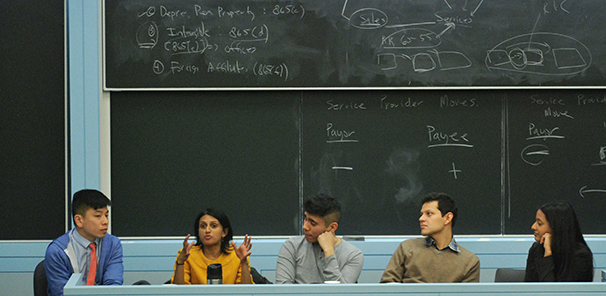Panel gives immigration reform LGBTQ spin
February 12, 2014

A panel gathered at the NYU School of Law’s Furman Hall on Feb. 11 to discuss immigration reform in the context of LGBTQ rights.
The lecture, titled Queering the Broken Immigration System, was sponsored by NYU OUTLaw — an organization for LGBTQ law students and allies — and featured lawyers Iván Espinoza-Madrigal of the HIV Center for Law and Advocacy, Clement Lee of Immigration Equality and Marika Dias of Make the Road New York, as well as CUNY senior and student activist Luis Saavedra representing the UndocuQueer project from the New York State Youth Leadership Council. NYU Law professor Alina Das moderated the event.
Michael Szeto, a second-year law student and board member of OUTLaw, said LGBTQ discourse often stops at a basic concept of equality.
“LGBT issues cross over to so many different concerns and problems,” Szeto said. “We’re hoping to show that LGBT rights and LGBT issues go beyond marriage fairness.”
The panel pointed out several difficulties that queer people face. Many queer immigrants of color still deal with undue trouble in legal contexts, such as detention centers misplacing transgender immigrants or often unnecessarily placing transgender immigrants in solitary confinement.
“We’ll get [cases] where the detention center simply doesn’t know how to house them,” Lee said, explaining an instance where a client was locked in a medical office due to the lack of a solitary confinement facility.
The community also faces hardships in obtaining asylum for immigrants who face danger in their mother countries because of their orientations.
“Nominally, Mexico has some laws that protect gay folks,” Lee said, explaining why the United States tends to deny an asylum request on the basis of safety. “That doesn’t correspond to the sort of quotidian day-to-day dangers that our clients face.”
Even the repeal of the Defense of Marriage Act has complicated matters for the LGBTQ immigrant community, Espinoza explained.
“How are couples going to be treated?” Espinoza said, referencing married queer binational couples applying for a green card through marriage. “We have to make sure that the implementation is actually being done appropriately and consistently regardless of where people are applying.”
The panel noted that, in any case, marriage reform is not the same as immigration reform, especially for those people who cannot or do not want to get married.
“If we say Windsor v. Perry fixed the whole immigration context, then we are blinded to the fact that many people in our community don’t want to get married,” Espinoza said. “To premise immigration protection around one particular status, like your marital status, is also privileging certain experiences over other experiences.”
As a queer immigrant himself, third-year NYU law student César Francia was appreciative of the event.
“This is the first panel that I’ve seen about queer immigration issues in three years,” Francia said.
Fellow queer immigrant, third-year NYU law student Wendy Cheng, confirmed this, stating that the topic of queer immigration only comes up in her LGBT Rights Clinic.
“But if you talk about general immigration law class and debate, usually it’s not a very discussed topic,” Cheng said.
Francia said there is a larger meaning to the silence.
“I think it’s a reflection on where we are as a society,” he said. “Gay issues are moving forward in many arenas, but they’re not front-and-center in the ways we want to be in terms of social reform.”
A version of this article appeared in the Wednesday, Feb. 12 print edition. Casey Dalrymple is deputy managing editor. Email him at [email protected].
























































































































































John Francis Fox • Feb 13, 2014 at 9:32 am
I think that Caseu Dalrymple should be commended for his article on gay and transgendered immigrants, but I don’t think it’s a good idea to use the word “queer.” Whenever anyone discusses homosexual people, it’s better to say “gay” or “lesbian.” And when someone discusses transgendered people, it’s better to say “transvestite” or “transsexual.”